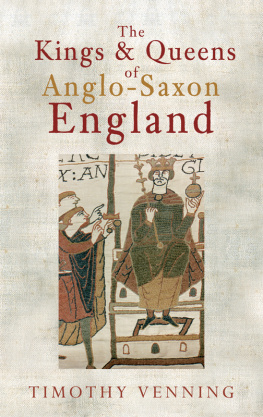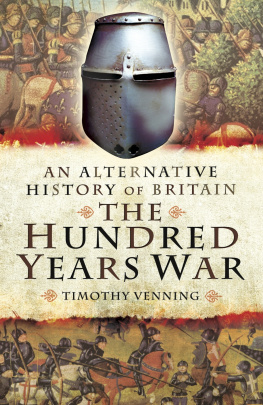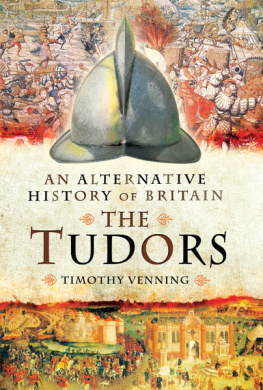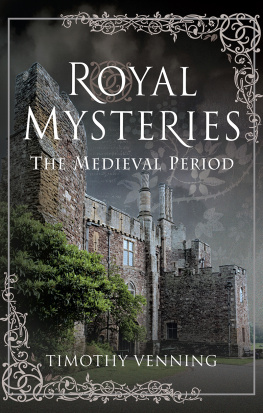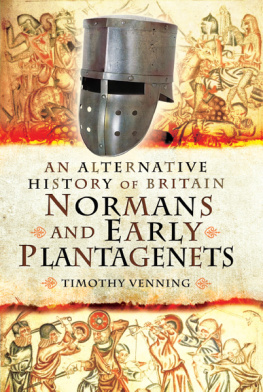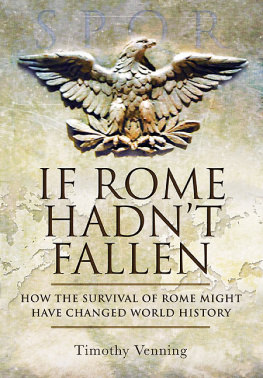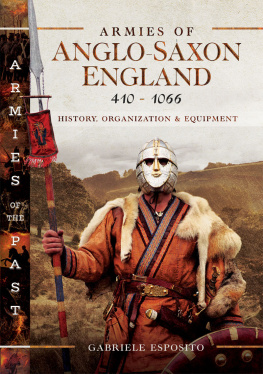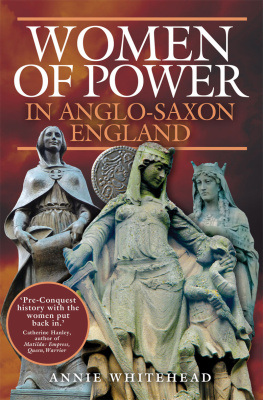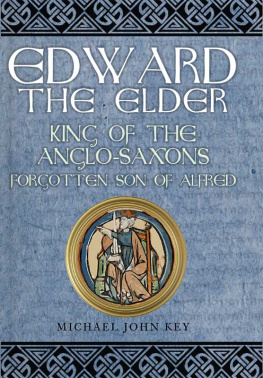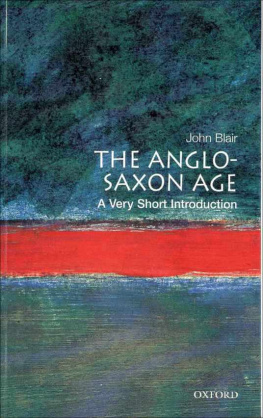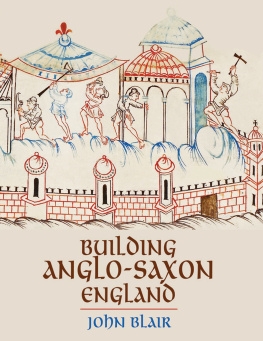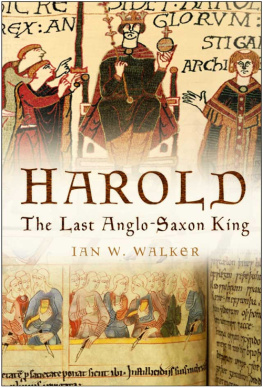About the Author
Timothy Venning received his PhD in History from Kings College, London. His previous books include If Rome Hadnt Fallen and The Kings & Queens of Wales. He lives in Hampshire.
This electronic edition published 2013
Amberley Publishing
The Hill, Stroud, Gloucestershire
GL5 4EP
www.amberley-books.com
Copyright Timothy Venning 2009, 2013
ISBN 9781445608976 (PRINT)
ISBN 9781445624594 (e-BOOK)
All rights reserved. No part of this book may be reprinted or reproduced or utilised in any form or by any electronic, mechanical or other means, now known or hereafter invented, including photocopying and recording, or in any information storage or retrieval system, without the permission in writing from the Publishers.
British Library Cataloguing in Publication Data.
A catalogue record for this book is available from the British Library.
Contents
Introduction
The Problem of the Sources
It has become the fashion in recent decades to emphasise the development of the Anglo-Saxon kingdoms of post-Roman England in terms of social and economic (and cultural) developments, as opposed to a lineal narrative of their leadership. The latter was long the established mode for recording history, as was the overall sense of a progressive pattern of development from primitive and local polities to the unity of a single English state. Indeed, the fashion for this was set as far back as the Northumbrian monastic historian Bedes pioneering Ecclesiastical History of the English People, written in the early 730s, where he traced the development of the kingdoms founded by those Germanic peoples who migrated to England after the fall of Roman Britain in tandem with their conversion to and promotion of Christianity and the heroic role of such Christian warrior-kings as Edwin and Oswald of Northumbria. Indeed, Bede first mentioned the concept of Anglo-Saxon England, describing the three peoples who came to England from the north-west of continental Europe in the fifth and sixth centuries as the Angles, the Saxons and the Jutes, the latter being less successful than the first two and gradually being eclipsed. All were thus subjective histories, writing for a socio-political purpose and perhaps bending or ignoring the facts if the latter did not fit the narrative? In addition, there is the problem that kingdoms of little interest to the West Saxon-led narrative in the Chronicle tended to be left out of their account, as with the East Saxons, East Angles, and to a certain degree Mercia, and Bede significantly downplayed the role of pagan rulers of whom he disapproved, both predecessors of the Christian kings in his native Northumbria (e.g. the sixth-century kings of Deira and Bernicia) and seventh-century foes of his heroes Edwin and Oswald, such as the ferocious and successful Penda, the first great king of Mercia (r. c. 62655). In view of the known evidence, can we really agree with Bede that Penda was not a bretwalda, i.e. the main over-king of the English, in the period of his greatest success in 64255, or that Oswy rather than the Christian Mercian Wulfhere was not more powerful in southern England in the 660s?
The linear narrative of history and its concentration on politics, war and national leaders was duly followed by subsequent historians after the Norman Conquest, e.g. Henry of Huntingdon and William of Malmesbury. This version of history was followed in a simplified form by generations of school textbooks well into the mid-twentieth century, and was bound to meet a reaction quite apart from careful research studies of particular events providing contradictory evidence and showing that the real picture was not that simple. To the Marxist historians, social and economic developments had a far greater effect than the choices of individual rulers, who were class enemies in any case. Was the ruling class only able to act within the constraints of its societys social and economic systems and its cultural traditions? And how much were the lives of ordinary people really affected by high politics and wars, except in an overwhelming catastrophe such as the landing of the Viking Great Army in 865 or the Normans in 1066?
The nineteenth- and early twentieth-century historians enthusiasm for history as the lives of kings and queens has been downplayed in recent decades, and in education the textbooks have ignored learning names of rulers by rote to the extent that many kings have dropped out of the public consciousness, even if they were only dimly there anyway. Children have been encouraged to empathise with the lives of ordinary people, as more relevant to them than politics and battles, and Anglo-Saxon archaeology has tended to reveal far more about the details of life in farming homesteads than about royal halls (the palaces of the era). In addition, greater knowledge of the intentions of, and literary constraints on, the writers of the early sources has raised problems about their reliability. Were they really writing objective or trustable history in the modern sense? And were kingly genealogies created for contemporary political purposes and capable of inventing or bending facts about earlier generations to suit the intended objective?
This issue is particularly relevant for the era of conquest itself a problematic concept at variance with the evidence of archaeology. The picture of fifth-century mass murder by land-grabbing Germanic immigrants on a genocidal scale, the burning of towns and farms alike, and the flight of the post-Roman British populace to the hills of Wales presented by Gildas c. 540 (DNA evidence of genocide is only found in the Viking-settled Hebrides.)
In recent years the fashion seems to be moving back to more narrative history and to the at least partial study of leadership, not least to provide a basic sequential study of the development of the English nation and how a series of small, local states came to merge into one kingdom of the southern and central parts of the British mainland. The obscure history of minor Anglo-Saxon states therefore does matter, as the building-blocks of the English state which emerged as the kingdom of Wessex forcibly unified both Anglo-Saxon and Viking Scandinavian states in the 910s. The basic narrative can be reconstructed, albeit with many caveats, particularly for the earlier centuries, and with a need to point out the limitations of the sources. There is much that we do not know and much that has been misconstrued, not least the amount of survival of post-Roman Celtic British people in southern and central England. There sems to have been more than a transfer of political power and cultural leadership to a new, alien elite as in 1066 not least as the pre-conquest indigenous language of the ordinary people broadly vanished in seventh-century official linguistic terminology (e.g in the c. 700 Wessex law-code), but survived and re-emerged after 1066. There was little sign of any surviving British land-owning class in Anglo-Saxon England, unlike in Germanic-conquered Gaul; and the term for the previous inhabitants in the Wessex law-code, Wealh (i.e. Welsh), doubles up for slave and foreigner which is an indication of contemporary attitudes. Yet the names of some early Germanic rulers are British, including those of the West Saxon dynastic founder Cerdic and two successors, Cynric and Caedwalla.
It may be impossible to do more than guess at the element of British/Welsh contribution to rulership and society after 500, but it is easier to point out the equal importance of sheer chance or what we would call leadership skills. Even with the advantages of geography and resources, would Northumbria ever have emerged as a major player in seventh-century politics but for a line of dynamic leaders, such as Aethelfrith (largely ignored by Bede as a pagan), Edwin, Oswald and Oswy? Or Wessex have emerged but for the (brief) career of the warlords Ceawlin and Caedwalla, or Egberts assumption of national leadership as Mercia perhaps ground down by exhaustive wars against the Welsh faltered after the unexpected extinction of Offas dynasty in 796 and the death of Coenwulf without a son in 821? Did its isolation from central England and inability to keep its rivals short of resources after 616 doom Kent despite the success of Aethelbert as leader of the southern English? Would East Anglia briefly the leader in southern affairs in the late 610s have been able to outmatch its rivals but for the unification of Mercia and the weakness of Raedwalds successors? Was Northumbria doomed as a leader of south-central England as it was too isolated in the north, and what would have happened had its military power not been weakened by Ecgfriths downfall at the hands of the Picts (685) and the constant civil strife of the eighth century? At a later date, would all England have been Scandinavianised but for Alfred? Did the autonomist tendencies of Viking York aided by help from Dublin only delay English unity in the mid-tenth century due to the early deaths of Athelstan (939) and Edmund I (946)? Did Edgars early death (975) doom England to another round of Viking attacks, and the unexpected extinction of Cnuts dynasty (1042) give Edward the Confessor an unlikely chance to rule? Above all, what of the near misses of the complex events of 1066? Much could depend on the outcome of a single battle, whatever the likelihood that greater resources would inevitably cause a particular kingdom to prevail; the ruin of Edwins dynasty after the battle of Hatfield Chase in 633/4, the death of Penda at Winwaed in

